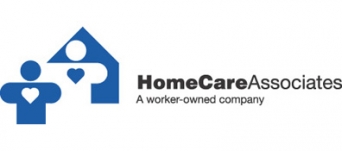



Home Care Associates of Philadelphia, Inc.

Pennsylvania, United States
October 2012
Home health care
Service with Minor Environmental Footprint
United States
Since 1993, Home Care Associates of Philadelphia (HCA) has dedicated itself to a quality care through quality jobs mission. By providing quality home care jobs, HCA works to ensure quality care across the Philadelphia metropolitan area for elders and people with disabilities. Throughout its history, HCA has trained and placed more than 1,800 people in quality employment. Today, nearly all of its 170 staff is made up of women who are also the cooperative’s worker-owners. In a continued recession, Philadelphia faces unemployment rates near 11 percent, with HCA’s targeted communities seeing significantly more challenging employment and living conditions. HCA responds by providing free training and guaranteed, high-quality jobs for hundreds each year. In the home care industry, aides must typically hold a number of part-time jobs to earn a decent income. In contrast, HCA provides its home health aides with full-time hours, and employees also receive: health insurance; dental insurance; transit passes; paid time-off; life insurance; worker-ownership opportunities; case management; and other supportive services. These practices promote retention for HCA’s workforce and ensure continuity of care for clients. HCA provides competitive wages, and its employees receive regular raises.
Overall B Impact Score
Governance 19.0
Governance evaluates a company's overall mission, engagement around its social/environmental impact, ethics, and transparency. This section also evaluates the ability of a company to protect their mission and formally consider stakeholders in decision making through their corporate structure (e.g. benefit corporation) or corporate governing documents.
What is this? A company with an Impact Business Model is intentionally designed to create a specific positive outcome for one of its stakeholders - such as workers, community, environment, or customers.
Governance 19.0
Governance evaluates a company's overall mission, engagement around its social/environmental impact, ethics, and transparency. This section also evaluates the ability of a company to protect their mission and formally consider stakeholders in decision making through their corporate structure (e.g. benefit corporation) or corporate governing documents.
What is this? A company with an Impact Business Model is intentionally designed to create a specific positive outcome for one of its stakeholders - such as workers, community, environment, or customers.
Workers 56.8
Workers evaluates a company’s contributions to its employees’ financial security, health & safety, wellness, career development, and engagement & satisfaction. In addition, this section recognizes business models designed to benefit workers, such as companies that are at least 40% owned by non-executive employees and those that have workforce development programs to support individuals with barriers to employment.
What is this? A company with an Impact Business Model is intentionally designed to create a specific positive outcome for one of its stakeholders - such as workers, community, environment, or customers.
Community 14.5
Community evaluates a company’s engagement with and impact on the communities in which it operates, hires from, and sources from. Topics include diversity, equity & inclusion, economic impact, civic engagement, charitable giving, and supply chain management. In addition, this section recognizes business models that are designed to address specific community-oriented problems, such as poverty alleviation through fair trade sourcing or distribution via microenterprises, producer cooperative models, locally focused economic development, and formal charitable giving commitments.
Environment 3.6
Environment evaluates a company’s overall environmental management practices as well as its impact on the air, climate, water, land, and biodiversity. This includes the direct impact of a company’s operations and, when applicable its supply chain and distribution channels. This section also recognizes companies with environmentally innovative production processes and those that sell products or services that have a positive environmental impact. Some examples might include products and services that create renewable energy, reduce consumption or waste, conserve land or wildlife, provide less toxic alternatives to the market, or educate people about environmental problems.
Customers 44.4
Customers evaluates a company’s stewardship of its customers through the quality of its products and services, ethical marketing, data privacy and security, and feedback channels. In addition, this section recognizes products or services that are designed to address a particular social problem for or through its customers, such as health or educational products, arts & media products, serving underserved customers/clients, and services that improve the social impact of other businesses or organizations.
What is this? A company with an Impact Business Model is intentionally designed to create a specific positive outcome for one of its stakeholders - such as workers, community, environment, or customers.